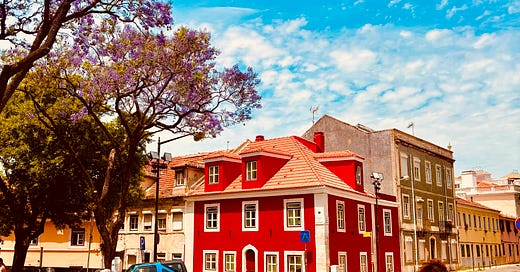Propaganda I’m not falling for
Because the world is fraught enough without blaming individuals for systemic failings
Since my husband Cody and I began thinking about moving to Portugal, the worries have been there.
Worries about what our colleagues and community would think.
Worries about how we might appear to those who couldn’t leave.
Worries about the impression we would leave on locals in our new chosen country.
Worries about how (or if) we could struggle openly as we transitioned to a new life.
Worries about being those Americans:
The ones who didn’t worry enough about the economic impact of their move on a new city.
The ones who brought their American salaries abroad and bragged about cheap produce.
The ones who couldn’t humble themselves long enough to learn the language.
The ones who couldn’t take their rose-colored glasses off long enough to see that humans are human everywhere, and that many of the same problems we had at home were being suffered elsewhere.
But you know what I’m not worried about on Juneteenth, this day of recognition for Black joy, liberation, and freedom?
Whether I earned the right to leave.
I get it. There are real implications when people with economic and social capital leave privileged nations and arrive in developing or struggling countries. They often bring stronger currency, native English, and remote jobs, driving up costs for locals. I’ll call that what it is: gentrification by a thousand paper cuts.
But what I don’t get at all is shaming people from the U.S. who aren’t ‘truly’ persecuted for not staying to fight. People attempting to gatekeep who is worthy of an exit, how much privilege one must recognize before packing their suitcases, and trying to dim the joyful experiences people find in their new homes. “Just you wait,” they write. “It won’t be all roses where you’re headed. There’s suffering everywhere, and digital nomads shouldn’t be allowed to escape their share.”
These folks use ‘expat’ and ‘immigrant’ interchangeably, seemingly intent on convincing Americans who move abroad that it’s them, not the structural systems they try so hard to leave, that are the problem.
If I’m honest, I think I know who those pieces are really written to and about: the well-off, young, flamboyant expat, camping out in picturesque places for shots to put on Instagram and paying double for newly renovated flats in old, gentrifying neighborhoods. The people who come for a few months or a few years, leaving cultural insensitivity in their wake; no real attempts to integrate and learn, laughing far louder than is necessary in public spaces, their OH-BREE-GAH-DOHs causing heads to turn, eyes to roll.
But I dare say most immigrants don’t fit that description by a mile. And even if they came close, they are still people who have chosen to uproot and reinvent themselves, contort and shift, and exist somewhere else.
Here’s the thing. And I’m not going to hold anyone’s hand when I say this:
I am the eldest daughter of South American immigrants whose childhood was so traumatic on their native soil that they moved across an ocean to avoid repeating it for their kids.
I am a dark skinned Black woman, cancer survivor, and first-generation college graduate who somehow dug her way out of $128,000 in student loan debt.
I have mourned the blood and lives of Americans who share my melanin.
I have grieved for Black and brown people in a country built to exploit, profit from, incarcerate, and disenfranchise them.
I have chosen not to have children in large part because I don’t believe America deserves anything my womb creates, and I am convinced the world they will inherit will not be as kind to them because of their hue. I say this unflinchingly.
So when I, Ashley Strahm, 34 years of age and of sound mind, saw a chance to move to a country that would better honor my body and soul, I did so without hesitation. I implore anyone else with layered identities to find places that better serve them if their life circumstances allow. Without guilt.
Because for the first time in my life, I am leveraging my U.S. citizenship to my own benefit — to cure my wounded psyche. To heal. To recognize that even though there is no utopia devoid of Black subjugation or othering, I deserve to find a place that comes close. I argue that every single marginalized human deserves that, too.
I am not the only one who has taken this path: James Baldwin, Audre Lorde, Josephine Baker, and countless other Black leaders and thinkers understood that there is no escaping white supremacy. After all, we bring our Blackness everywhere. But we left anyway. Because there are places to escape the unique, eviscerating pain America inflicts. (And despite Portugal’s history as a catalyst of the Transatlantic slave trade, I am willing to adjust to smaller instances of social friction to live in the 6th safest country on the globe.)
Weirdly, it’s not enough for some to see an America that is burning and on the brink to nod in silent support of people who saw fit to leave it. Somehow, folks (largely a part of the global minority) want to go a step further; they want to blame those individuals for systemic issues, or call them the gentrifiers of countries who invented gentrification and colonization on a global scale. They want to assume we are brash, bold, bastions of economic excess, content to price natives out of their homes just because we can.
If I may — a gentle suggestion to look a bit closer to home before trying to assign blame to those of us who have said enough is enough. The pool of blue cities where rights are preserved, where one can live with less fear, is shrinking (and wasn’t ever enough for marginalized communities to begin with). Those cities, for the record, are vastly more expensive than anyone can afford on a minimum wage; a problem that exists from San Juan to Santiago, Chile. Tech workers moving to Austin, TX or Asheville, NC contribute similar gentrifying energy to their new homes — except their new neighbors don’t have the social safety nets Europeans have to combat rising rents.
I’m trying to tell the rawest stories I can about what it’s really like to leave, adapt, and reckon with myself on a new shore. And I know I don’t have to, but I feel the need to defend those who were never protected on their home soil, who have chosen to leverage what they have to build a foundation elsewhere. I’m trying to tell the truth about it all, and that sacred repository is what you’re finding here in our little corner of the internet.
I’m doing this for other Black women/marginalized people who deserve to experience what America has long promised but never delivered.
I’m doing this to prove that there are kinder, simpler ways to live that simply are not built into the infrastructure of America’s individualistic, capitalist, white Christian nationalist, win-at-all-costs culture.
I’m doing this to explain something I know in my heart to be true: the reasons people move abroad are as diverse, multifaceted, and beautiful as the people they are.
And I’m writing this now to unabashedly state that no one needs a gun pointed directly at their forehead, to have the immediate threat of deportation, or be subjected to unnamed atrocities before they can earn the right to leave in the eyes of those who mock their decision. Your reasons are enough.
I speak for myself when I say this:
I moved because it was more painful to stay than it was to uproot my life.
I moved because my country of birth has been clear about how little it values my life within its borders.
I moved because the cost to my spirit was too great to remain where I was.
For those of you reading this who see yourself in my experience, I offer warm, open arms to you. The circumstances of your pursuit of wellness and safety are valid and unique to you.
For those of you who see elements of my story and aim to project guilt or shame about the ‘right’ way to exist in spaces, or the ‘responsible’ countries people ‘should’ have chosen, please, resist the urge. I forgive you for falling prey to the impulse to police others as you likely have been policed, but that energy has no home here.
Immigrants know what grit is. My life is the product of two Black people who chose to leave their first homes. It is a legacy I know well, and I am doing my best to live into it.
Migration will continue to happen for as long as people cannot see a future from where they sit. And more often than not, immigrants are hoping to fill the cracks in their broken vases so they can hold more water to quench the thirst of others.
If you want more people in the collective fight for better lives, you’re going to need full cups. Let people fill theirs wherever they find water.
I’m not falling for the propaganda that says that:
— Intentional immigration isn’t possible
— The circumstances of our birth are our destiny
— Immigrant journeys aren’t hard, personal, and complex
— Our loyalty to a zip code says anything about the content of our character
— Only some people deserve the opportunity to see the world on their terms
It costs nothing to pull up a chair beside those brave souls; to nourish them, to wish them well, to offer a word of kindness and curiosity about their journey to liberation. More of that, please.






You’ve made so many valid points but I’d especially like to highlight this one:
"But what I don’t get at all is shaming people from the U.S. who aren’t ‘truly’ persecuted for not staying to fight. People attempting to gatekeep who is worthy of an exit, how much privilege one must recognize before packing their suitcases, and trying to dim the joyful experiences people find in their new homes."
The morning after the latest US presidential election I was torn. Half of me wanted to stay and fight, and the other half thought that even a bird knows when to fly away. My friends where split when I decided to stay (for now). Some of them were and are happy that I’m still here, others are worried that because I’m a transgender woman I’m increasingly in danger. They’re right about the increased danger and right to be worried.
It sounds to me that you and your husband made the best decision you could for yourselves - not that my or anyone else’s opinion matters. America is a nation of immigrants brave enough to leave a dangerous situation and start over someplace new - often with little more than the clothes on their backs and what little belongings they could carry in their hands. Brave people just like your parents. Just like you and your husband when you decided it was time to emigrate from the US.
There are likely to be many more of us leaving in the next few months and years, and for the most heart breaking of reasons.
I love this so much. I have often felt the need to justify my departure, although often just saying I'm from Texas is enough.